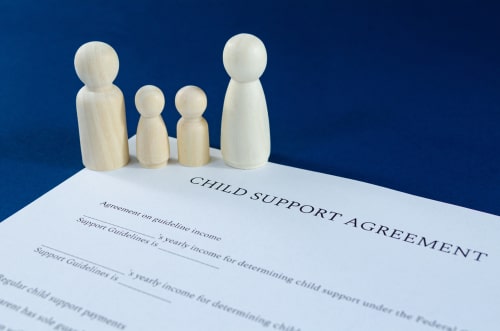Recent Blog Posts
Will My Wife Get All Parental Rights in Our Illinois Divorce?
 There is a common assumption that if a couple has children, the mother will automatically get most of the parental rights and responsibilities in a divorce: the mother will get full custody and the father will only be able to visit with the children; the mother will have all decision-making rights for the children, regarding their schooling or healthcare or anything else; the father will pay child support and the mother will be the main parent in the child’s life. These assumptions are no longer accurate.
There is a common assumption that if a couple has children, the mother will automatically get most of the parental rights and responsibilities in a divorce: the mother will get full custody and the father will only be able to visit with the children; the mother will have all decision-making rights for the children, regarding their schooling or healthcare or anything else; the father will pay child support and the mother will be the main parent in the child’s life. These assumptions are no longer accurate.
Every state has its own laws for this section of the law, and even within each state, every divorce is unique. There is no hard rule about "all" divorces being decided in any certain way. That means there is no reason to assume your spouse will get all the parental responsibilities in a divorce. If you are a father and are considering divorce, an experienced DuPage County, IL, divorce lawyer will be able to answer any questions and explain what you can expect with knowledge and sensitivity.
What Can I Expect in an Illinois Divorce Settlement?
 Every divorce is unique. Some couples can settle their separation amicably, through an uncontested divorce. Other couples might have such powerful animosity that they may go through what is called a high-conflict divorce. Some couples will settle their divorce in court, while others will do so through mediation. Regardless of the different ways a divorce could be settled, the actual aspects of life that need to be decided on in the divorce settlement are generally similar. If you are considering divorce, an experienced Kane County, IL, divorce attorney can explain what you can reasonably expect your divorce settlement to include and begin working on a plan to protect your best interests.
Every divorce is unique. Some couples can settle their separation amicably, through an uncontested divorce. Other couples might have such powerful animosity that they may go through what is called a high-conflict divorce. Some couples will settle their divorce in court, while others will do so through mediation. Regardless of the different ways a divorce could be settled, the actual aspects of life that need to be decided on in the divorce settlement are generally similar. If you are considering divorce, an experienced Kane County, IL, divorce attorney can explain what you can reasonably expect your divorce settlement to include and begin working on a plan to protect your best interests.
What Issues Are Covered in a Divorce Settlement?
A divorce can take time to be settled because the couple needs to figure out how all the parts of their life that were bound together in marriage will now be divided up. A typical divorce settlement will include the following aspects:
What Should I Know About Working with a Guardian Ad Litem
 While it is true that no two divorces are the same, there are still some issues that commonly come up. Whether the two spouses are splitting up amicably or are unable to even make eye contact, they will still generally need to figure out asset division, spousal support, and property division. And regardless of how easily a couple can reach agreements about all those things in a divorce, child custody issues are commonly difficult to work out.
While it is true that no two divorces are the same, there are still some issues that commonly come up. Whether the two spouses are splitting up amicably or are unable to even make eye contact, they will still generally need to figure out asset division, spousal support, and property division. And regardless of how easily a couple can reach agreements about all those things in a divorce, child custody issues are commonly difficult to work out.
A couple can be ending their marriage on great terms and still find it nearly impossible to formulate a plan for how they will raise their children in this new dynamic. Also, parents can sometimes be so wrapped up in worry about the divorce settlement they might not always feel able to keep their children’s best interests at the center of their minds.
In such cases when parents cannot agree on how their parental responsibilities should be divided in divorce, a guardian ad litem, or GAL, can be appointed by the court. This is a legal representative specifically tasked with advocating for the child’s interests. If you believe an acrimonious divorce may be in your future, it might be good for you to understand what exactly a GAL does. An experienced DuPage County, IL child custody attorney can answer your questions and help prepare you for the next steps in your divorce.
Should My Spouse and I Sign a Postnuptial Agreement?
 Many people have heard about a prenuptial agreement, a sort of contract drawn up between two people about to join together in the bonds of marriage. A prenuptial agreement is like a rainy-day policy: something you have ready “just in case” but hope you will not need. However, engaged couples often opt out of a prenuptial agreement and later regret doing so. If you are already married but think having an agreement in place “just in case,” a Kane County, IL divorce lawyer can help guide you and your spouse through the process of establishing a postnuptial agreement.
Many people have heard about a prenuptial agreement, a sort of contract drawn up between two people about to join together in the bonds of marriage. A prenuptial agreement is like a rainy-day policy: something you have ready “just in case” but hope you will not need. However, engaged couples often opt out of a prenuptial agreement and later regret doing so. If you are already married but think having an agreement in place “just in case,” a Kane County, IL divorce lawyer can help guide you and your spouse through the process of establishing a postnuptial agreement.
What Is a Postnuptial Agreement?
To a large degree, a postnuptial agreement is almost the same as a prenuptial agreement, aside from the fact that it is signed after a wedding instead of beforehand.
Similar to a prenuptial agreement, a postnuptial agreement will aim to:
Why Should I Be Careful about Social Media Usage Before Divorce?
 Social media is unquestionably a fact of life these days. People use social networks to connect with geographically distant friends and family, share milestones and view those of their friends, meet potential romantic interests, do some professional networking or collaboration, and a ton of other things. But be warned: anything you post online can be seen by anyone else who tries hard enough, which could affect your divorce. Suppose you are considering divorce and are concerned your social media conduct might influence your divorce settlement. In that case, you should speak with a knowledgeable Kane County, IL divorce attorney who can answer your questions and advise you on moving forward.
Social media is unquestionably a fact of life these days. People use social networks to connect with geographically distant friends and family, share milestones and view those of their friends, meet potential romantic interests, do some professional networking or collaboration, and a ton of other things. But be warned: anything you post online can be seen by anyone else who tries hard enough, which could affect your divorce. Suppose you are considering divorce and are concerned your social media conduct might influence your divorce settlement. In that case, you should speak with a knowledgeable Kane County, IL divorce attorney who can answer your questions and advise you on moving forward.
How Can Social Media Impact My Divorce Settlement?
Unfortunately, some people are willing to do anything they can to get the settlement they want, including lying and deceiving. They may try to paint the picture of an unfaithful spouse, someone lying about their actual wealth so they can seem eligible for receiving alimony payments or at least not be required to pay to the other spouse, someone unfit to care for children, and more. But with the ever-increasing popularity of social networks, people are constantly posting pictures online for the world to see. This means it is now much easier than it ever used to be to try to gather evidence of claims against someone. With easy access to personal information about other people, the claims have the potential to influence decisions in a divorce settlement. For example:
Can My Ex Stop Me from Relocating with Our Kids?
 When parents go through a divorce, they need to reach agreements on several different issues that can affect their family. Even if the divorce is not contentious and the two sides can come to an amicable settlement, the parenting plan that they formulate will naturally be based on their circumstances at the time of the divorce. As often happens in life, sometimes unexpected changes can happen to a divorced parent, and these can make it challenging to adhere to the original parenting plan. If changes in your life have you considering changes to your parenting plan, an experienced DuPage County, IL divorce lawyer can explain what rights you have under Illinois law.
When parents go through a divorce, they need to reach agreements on several different issues that can affect their family. Even if the divorce is not contentious and the two sides can come to an amicable settlement, the parenting plan that they formulate will naturally be based on their circumstances at the time of the divorce. As often happens in life, sometimes unexpected changes can happen to a divorced parent, and these can make it challenging to adhere to the original parenting plan. If changes in your life have you considering changes to your parenting plan, an experienced DuPage County, IL divorce lawyer can explain what rights you have under Illinois law.
What Is the Law in Illinois about Parental Relocation?
Typical changes that people go through in life can complicate matters for divorced parents. For example, if your Illinois divorce settlement includes the fact that you will be paying child support, but then years later, you lose your job, you would likely find it difficult to continue making the payments you originally agreed to. If the parenting plan that you agreed to includes certain times when your children sleep in your respective homes and then your ex starts to seriously date someone who sleeps over, you may no longer feel comfortable with your children sleeping there, too. Another life change that can complicate matters for divorced parents is relocation.
What Does the State of Illinois Consider Grounds for Divorce?
 In the State of Illinois, the only reason that the courts will deem acceptable for divorce is something called irreconcilable differences since Illinois is a “no-fault” state. It does not matter if one spouse was disloyal, lied, or hurt the other. According to the State of Illinois, the only acceptable reason for divorce is irreconcilable differences, and in such a case, neither side is to blame.
In the State of Illinois, the only reason that the courts will deem acceptable for divorce is something called irreconcilable differences since Illinois is a “no-fault” state. It does not matter if one spouse was disloyal, lied, or hurt the other. According to the State of Illinois, the only acceptable reason for divorce is irreconcilable differences, and in such a case, neither side is to blame.
Irreconcilable differences mean the marital relationship has broken down, and all attempts to reconcile have failed. If you are in Illinois, you have tried to reconcile with your spouse, and you can see that these attempts are futile, it could be an excellent time for you to speak with an experienced Kane County divorce attorney.
What Are Irreconcilable Differences?
In some parts of the United States, fault-based grounds are deemed acceptable in divorce cases. This means that if one spouse cheated, lied, hid assets, or did any other number of things found to be at “fault,” the divorce settlement would likely favor the other spouse. This could have implications for parental rights and responsibilities, child support, spousal support, and other factors in a divorce. In such a case, it might be in one side’s best interest to prove that the other side is guilty of wrongdoing to ensure a favorable divorce settlement.
What Is Involved in an Illinois Divorce Deposition?
 Sometimes, a divorce can be finalized amicably through mediation. Some divorces are finalized by the spouses’ respective lawyers negotiating the various issues that need to be decided. Other times, in a highly contentious contested divorce, a deposition is used to help gather information before a court trial. If you believe a deposition is in your future, a Kane County, IL divorce attorney can explain what you can expect and guide you through the process.
Sometimes, a divorce can be finalized amicably through mediation. Some divorces are finalized by the spouses’ respective lawyers negotiating the various issues that need to be decided. Other times, in a highly contentious contested divorce, a deposition is used to help gather information before a court trial. If you believe a deposition is in your future, a Kane County, IL divorce attorney can explain what you can expect and guide you through the process.
What Should I Know about a Divorce Deposition?
A deposition is a way to get court-recognized testimony, out of the court. The sides have the opportunity to ask each other or other witnesses questions under oath, in the presence of a court reporter. The responses to these questions are recorded and can be used in court under limited circumstances.
In a divorce settlement, accurate information about each side’s debts, assets, income, and other financial information as well as information about each side’s parenting style, work demands, and schedules is crucial for determining a number of things:
Child Support and Unemployment
 When a couple with children goes through a divorce, there are many issues they need to work out in their divorce settlement. Where will each spouse live? Where will the children live? Who will decide where the children go to school? Who will pay child support, and how much will those payments be?
When a couple with children goes through a divorce, there are many issues they need to work out in their divorce settlement. Where will each spouse live? Where will the children live? Who will decide where the children go to school? Who will pay child support, and how much will those payments be?
The arrangements agreed upon during a divorce settlement are naturally based on the circumstances at the time of the divorce. But if conditions change, it could have a huge impact on a parent’s ability to fulfill their end of the deal. If you are a parent who pays child support, and new circumstances are making it difficult for you to uphold those payments, a DuPage County, IL divorce lawyer can walk you through the process of child support modifications.
Can I Modify My Child Support Obligations in Illinois?
When you were finalizing your divorce settlement, it would have been natural for your child support agreement to be drawn up based on the income you were earning. But sometimes circumstances change. What happens if you get laid off, for example? Can the courts still require you to keep making the same payments even if you are no longer earning the income you once were?
How Can I Tell if My Spouse Is Hiding Assets from Me?
 In a typical happy marriage, both spouses are open and honest with each other. But for many couples, this is not their reality. In many marriages, someone might suspect their spouse of infidelity, someone might feel they are married to the wrong person, and someone might think their spouse is hiding assets from them.
In a typical happy marriage, both spouses are open and honest with each other. But for many couples, this is not their reality. In many marriages, someone might suspect their spouse of infidelity, someone might feel they are married to the wrong person, and someone might think their spouse is hiding assets from them.
In a high-asset divorce, concealing assets is a fairly common practice. One reason for this is that the spouse hiding the assets is hoping not to need to share them with their ex in a divorce settlement. Another reason is there are common misunderstandings about what each spouse is allowed to do with their marital assets. Being married does not mean your spouse is entitled to whatever they want in your joint finances.
If you are considering divorce but suspect that your spouse might be hiding assets that you would legally have rights to in a settlement, a Kane County, IL divorce lawyer can guide you through this stressful period.












